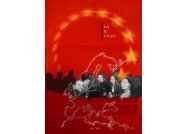turkish-greek civic dialogue - AEGEE Europe
turkish-greek civic dialogue - AEGEE Europe
turkish-greek civic dialogue - AEGEE Europe
Create successful ePaper yourself
Turn your PDF publications into a flip-book with our unique Google optimized e-Paper software.
136<br />
present themselves as they are from Thessaloniki, they will be able to find<br />
seats on the boats much more in advance. Hercules Millas told us that only<br />
the 3 rd generation emigrants are going through the phase of searching for their<br />
identities, where immigration reflects itself within the reaction of identity and<br />
co-existence.<br />
Small and marginal groups bear significant importance in democratisation<br />
processes.<br />
Sefer Güvenç reacted that Lausanne emigrants are neither a small nor a<br />
marginated group, but they are a group of people who are willing to contribute<br />
in peace both between the two communities and in the world.<br />
Renée Hirchon contributed that among the emigrants from Greece, the ones<br />
originally from Cunda identify themselves as “exchangee/exchanged – mübadil”,<br />
however the ones from Florina call themselves as “muhacir-refugee”, whereas<br />
emigrants from Manisa Muradiye uses the word “göçmen-emigrant”. In Greece<br />
both “göçmen-emigrant” and “mübadil- exchangee/exchanged” are in use.<br />
Filiz Yenişehirlioğlu stressed that an average person would not understand the<br />
Greek dialect spoken in Yanya where her family migrated from. The dialect is<br />
called Yanyaca.<br />
PERSONAL ASSESSMENT<br />
by BÜLENT TANDOĞAN<br />
Finally, I can speak on my personal behalf and tell you that I have been very<br />
well informed at the end of the whole symposium as I was dreaming. I would<br />
like to thank to Foundation of Lausanne Treaty Emigrants and <strong>AEGEE</strong> for the<br />
organisation of such a symposium, I am very much looking forward to the whole<br />
proceedings of the event.<br />
My general impression is that “our” speakers, academics from Turkey were<br />
acting more emotional and giving a lot of friendship messages, are expressing<br />
their sorrows even making confessions; they were reflecting all these elements<br />
into their speeches.<br />
The speeches by Greeks were more realistic and less emotional apart from one<br />
Greek guest, because of the very fact that we have started debating over such<br />
issues, which were supposed to take place much earlier, only very recently. In<br />
general, we are much more emotional than the Greeks.<br />
I couldn’t leave the symposium with full satisfaction, since some of the themes<br />
that naturally come to my mind in relation to the population exchange were not<br />
covered at all. Health problems during the exchange of populations, political<br />
struggles, cultural and social change in Anatolia and amongst the emigrants<br />
following the exchange, changes in political life, changed faces of cities after<br />
the exchange were amongst such issues. Luckily, I had the chance to find such<br />
issues covered in very recently published book of M.A.Gökaçtı titled “Exchange<br />
of Populations”, in particular the issues of settlements changing as a result of<br />
the exchange and the political change. I think it will be very useful for future<br />
to mention in such conferences the names of references and resources.<br />
Another point I want to complain is that there was no result declaration out of<br />
this unique conference, even though many important figures and participants<br />
were gathered on this occasion. This is a very common mistake in such<br />
organisations. I also would like to see a similar conference in such a scale in<br />
Greece with remarkable participation from Turkey. It would be wonderful if<br />
more guests and representatives from Emigrants associations in Greece could<br />
join us.<br />
mubadildostlar@yahoogroups.com<br />
SYMPOSIUM SPEAKERS<br />
...................................................................................................... Nikos Marantzidis<br />
Nikos Marantzidis is an Associate Professor teaching Political Science at the<br />
University of Macedonia in Thessaloniki. He is the author of Giassasin Millet, a<br />
book focusing on the Turkish speaking Greek refugees from Black Sea Region.<br />
.......................................................................................................... Damla Demirözü<br />
Damla Demirözü is a graduate of Ancient Greek and Latin. She obtained her<br />
Ph.D at the University of Athens at the Department of Modern Greek Language<br />
Population Exchange Association des Etats Généraux des Etudiants de L’<strong>Europe</strong>







